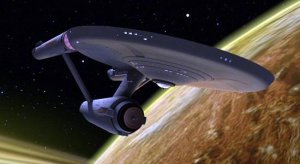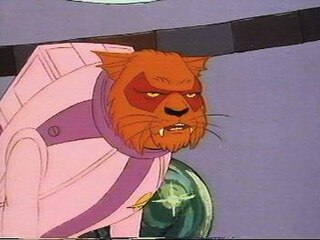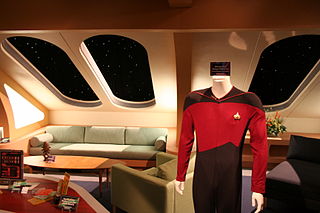
Enterprise or USS Enterprise is the name of several fictional spacecraft, some of which are the main craft and setting for various television series and films in the Star Trek science fiction franchise. The most notable were Captain James T. Kirk's USS Enterprise (NCC-1701) from the original 1960s television series, and Captain Jean-Luc Picard's USS Enterprise (NCC-1701-D) from Star Trek: The Next Generation.
In Star Trek a replicator is a machine capable of creating objects. Replicators were originally seen used to synthesize meals on demand, but in later series they took on many other uses.
"Coming of Age" is the 18th episode of the American science fiction television series Star Trek: The Next Generation. It first aired in broadcast syndication on March 14, 1988. Sandy Fries originally wrote the episode, but Hannah Louise Shearer performed an uncredited re-write. It is the only episode of the series directed by Mike Vejar, who went on to direct episodes of Deep Space Nine, Voyager and Enterprise.

Star Trek: The Experience was a themed attraction which opened in January 1998 at the Las Vegas Hilton in Las Vegas, Nevada, United States, based on the Star Trek entertainment franchise. The pavilion underwent one major renovation in 2004 which added the Borg Invasion 4-D attraction, which used state-of-the-art amusement technology where guests experienced an encounter with the Borg. Star Trek: The Experience was operated by entertainment management company Cedar Fair Entertainment Company after its June 2006 purchase of Paramount Parks from the CBS Corporation. It closed in September 2008, and was scheduled to reopen in the Neonopolis Mall on May 8, 2009 in time for the premiere of the Star Trek film. It was then pushed back to 2010, and then in 2011 it was announced that they had lost the license.
"Parallels" is the 11th episode of the seventh season of the American science fiction television series Star Trek: The Next Generation, the 163rd overall. It was originally released on November 29, 1993, in broadcast syndication. The episode was written by Brannon Braga, and directed by Robert Wiemer. Executive producer Jeri Taylor wrote the final scene of the episode, but was uncredited.

"Time Squared" is the 13th episode of the second season of the American science fiction television series Star Trek: The Next Generation, the 39th episode overall. It originally aired on April 3, 1989, in broadcast syndication. The episode was written Kurt Michael Bensmiller and directed by Joseph L. Scanlan.
"The Galileo Seven" is the sixteenth episode of the first season of the American science fiction television series, Star Trek. Written by Oliver Crawford and directed by Robert Gist, it first aired on January 5, 1967.
"Metamorphosis" is the ninth episode of the second season of the American science fiction television series Star Trek. Written by Gene L. Coon and directed by Ralph Senensky, it was first broadcast on November 10, 1967.
"False Profits" is the 47th episode of Star Trek: Voyager, the fifth episode of the third season. This is a science fiction television episode of the Star Trek franchise, that aired on UPN on October 2, 1996. This features special effect sequences of wormholes, shuttlecraft, and an inhabited exoplanet.
"Deja Q" is the 13th episode of the third season of the American science fiction television series Star Trek: The Next Generation, and the 61st episode of the series overall.

"The Slaver Weapon" is the fourteenth episode of the first season of the American animated science fiction television series Star Trek: The Animated Series. It first aired on NBC on December 15, 1973, and was written by Larry Niven. It was based on his original short story "The Soft Weapon". This episode was expanded to become the first half of a full-length novel by science-fiction author Alan Dean Foster as Star Trek Log Ten.
"Cathexis" is the 13th episode of Star Trek: Voyager, a science fiction television show that ran from 1995–2001. Part of the Star Trek franchise, it features a starship from the United Federation of Planets stranded on the other side of the Galaxy that must make its way home as it encounters aliens and various phenomena. On board a mixture of Federation, Maquis, and alien crew members live and work.

Lists of Star Trek spacecraft is a comprehensive breakdown of the spacecraft featured in the Star Trek franchise.
"Non Sequitur" is the 21st episode of Star Trek: Voyager, the fifth episode in the second season. Harry Kim is enigmatically stranded back on Earth, only to discover the lives of his companions have been radically altered. Much of the episode takes place on Star Trek's Earth in the same era as Voyager, but in alternate timeline caused by an anomaly.
The Star Trek franchise features many spacecraft. Various space vessels make up the primary settings of the Star Trek television series, films, and expanded universe; others help advance the franchise's stories. Throughout the franchise's production, spacecraft have been depicted by numerous physical and computer-generated models. Producers worked to balance often tight budgets with the need to depict convincing, futuristic vessels.

Galileo is a fictional spacecraft that appeared in the 1960s American science-fiction television series Star Trek. It was a shuttlecraft assigned to the USS Enterprise, and was the first of its type to be seen on screen in the franchise, appearing in the episode "The Galileo Seven". It appeared an additional four times in the series before being replaced by the Galileo II, a repaint of the full-size exterior model.
The following outline is provided as an overview of and topical guide to Star Trek:
String Theory: Cohesion is a 2005 novel by American author Jeffrey Lang, the first book of the Star Trek: Voyager series, a sci-fi series set in the Star Trek universe. It was released to commemorate the 10th anniversary of the television series Star Trek: Voyager and takes place between the 4th and 5th seasons.

"Fairest of Them All" is a fan-produced Star Trek episode released in 2014, the third in the web series Star Trek Continues, which aims to continue the episodes of Star Trek: The Original Series replicating their visual and storytelling style. It was written by James Kerwin and Vic Mignogna from a story by Vic Mignogna and directed by James Kerwin. Fairest of Them All is a direct continuation of the original Star Trek episode "Mirror, Mirror". In 2014, "Fairest of Them All" won the Burbank International Film Festival award for Best New Media in Drama.






